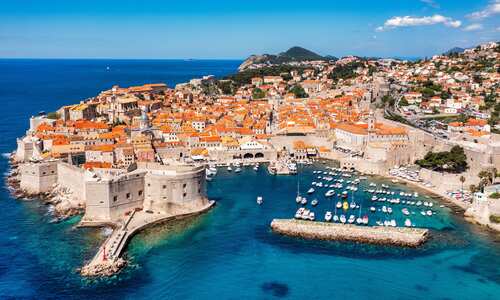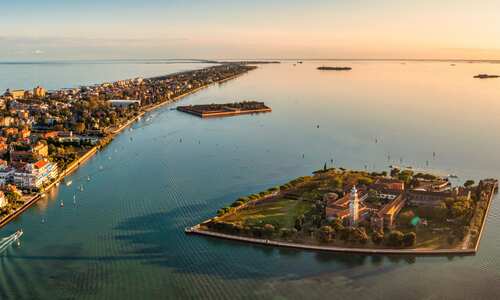Article content
12 October 2016 by Ronan Gay
This article originally appeared in Traveller magazine, authored by guest writer Fergal Keane.
The fortnight at Venice passed quickly and sweetly – perhaps too sweetly; I was drowning in honey, stingless. On some days life kept pace with the gondola, as we nosed through the side canals and the boatman uttered his plaintive musical bird-cry of warning; on other days with the speed-boat bouncing over the lagoon in a stream of sunlit foam; it left a confused memory of fierce sunlight on the sands and cool, marble interiors; of water everywhere, lapping on smooth stone, reflected in a dapple of light on painted ceilings; of a night at the Corombona palace such as Byron might have known, and another Byronic night fishing for scampi in the shallows of Chioggia, the phosphorescent wake of the little ship, the lantern swinging in the prow, and the net coming up full of weed and sand and floundering fishes...
– Evelyn Waugh, Brideshead Revisited
We arrived by night and crossed the lagoon towards the lights of the city. The boatman was sullen. He had kept us waiting and we upbraided him. Now he refused to speak at all. It recalled a scene from Thomas Mann’s novel Death In Venice. The principal character, Aschenbach, asks a gondolier,‘What do you charge for a ride?’ The gondolier refuses to look at him and says, with an air of menace, ‘You will pay.’
I wondered how many seasons it had taken to leech our boatman of basic friendliness, how many tourists going back and forth, and how many ends of days when he realised that he would always be the driver and never the owner of the boat? Of course, it may well have been that he was simply a dullard and his tardy time-keeping nothing more than an ingrained carelessness. Either way, I decided to ignore him.
This oaf would not be allowed to ruin the spectacle of arrival. We followed the path of the wooden channel markers, through air that smelled of the fullness of a flooding tide – a ripe sea-scent that was still thick with the heat of the day – and on into the first quiet canals where we were the only travellers on water, but where lovers on foot wandered in the shadows of the lanes.
I have not been a traveller, in the true sense of the word, for a long time. In recent years, I have jumped on and off planes and driven many thousands of miles, but this was always journeying with a purpose. Work de ned the parameters of my travel. My cities were marginal zones. My world was distorted. It was peopled by refugees and gunmen. I moved only among the desperate.

Such a way of living can make inroads on a man’s sense of wonder. So I came to Venice a little weary with the world and eager for respite. I wished to indulge what Thomas Mann called ‘a proclivity for the unorganized, the immeasurable, the eternal: for nothingness’.
And so it proved. The days and nights that followed were constructed out of chance. I slipped out of my life and left no note behind. I discarded maps and guidebooks.
On that first night I wandered through the alleys until I came to the piazza of Chiesa San Giacomo dell’Orio. The square was full of dancers, moving to the rhythm of Tango. The dance, the variant known as the Milonga, was a less melodramatic version but still bristled with passionate energy.
A thin young woman sat next to me. She watched the dance for a few minutes and then got up and walked away, stopping when she reached the other side of the square. Here she paused again and watched. When the music ended, she strode purposefully into the throng and tapped an older man on the shoulder.
I understood then that she had been carrying out a patient reconnaissance of prospective partners; she was searching for the true apasionado, a Tango master. Why be satis ed with something as transient as love, when she could find the eternal magic of the dance?
In Venice I learned to sleep a little later. When I opened the shutters, there was always a bright sun. I took my coffee in a small stone garden, listening to the horns of the ferries as they departed from the pier at the bottom of the street.
I met friends from Paris who showed me the Venice of their youth, the place where they had studied and fallen in love and whose simple joys they have spent years hoping to relive. This is not to say that they were unhappy in their present lives, but that Venice existed for them as a symbol of the most perfect independence they had ever known. There is, of course, never any returning to such a place.
Through them I met the concert pianist Gabriele Gorog, a Venetian of Hungarian roots who lives in Paris. He fed us with melon and prosciutto and talked of religion and reason before we all decamped to the Lido. The heat drove us into the sea.
I swam out as far as I could from the shore but could find no depth.There was nothing to do then but oat, until I heard the voices of my friends calling me to shore. My days were passing sweetly.
The writer is a BBC special correspondent.
Illustration by Luke Walwyn.






